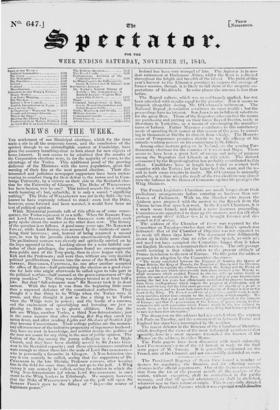The French Lee.dslative Chambers are much longer about their preliminary
arrangements before entering on business than our Houses of Parliament. With us, the :■lember who moves the Address goes prepared with the answer to the Speech from the Throne before that speech is read. In the French Chambers, it is a much more formal, and indeed a more decorous proceeding. Committees arc appointed to draw up the answer ; and not till after perhaps natty-days deliber•tien is it brought fbrward and dis- cussed in fall session.
The address of the Chamber of Peers was reported by the Committee on Tuesday—twebe days after the King's speech was delivered : that of the Chamber of Deputies was not expected to be ready till three days later. The docinnent thus deliberately drawn up is little more than an echo of the speech, as with us ; and need not have occupied the Committee lone; than it takes our English Members to construct their address. The only passage worth noticing is that which refers to the present attitude of France in relation to the rest of Europe. On this point the address proposed for adoption by the Committee observes-
" The treaty concluded 'between the Emperor of Austria, the Queen of Great Britain, the King of Prussia, the Emperor of Russia, and the Ottoman Porte, in order to regulate the relations between the Sultan and the Pasha of Egypt, and the acts which subsequently- took !dare, induced your Majesty to adopt measures which enabled France to observe, with an entire liberty of action, the march of events in the East. Sire, the polio : of your Government during the last ten years has efficaciously contributed to preserve humanity from those conflagrations which impede the progress of civilization, and of which nations long feel the fatal consequences; bat the &unity of e peopie is its VOW ee, and we know how much the dignity of Brunt's is dear to the heart of the King. The French would rise at p.aa. r and he ready to make m.o.!, sacrifice, sooner than consent to the de;ralation of their country. We trust, however, that a just and disinterested poiicy tviii prevail in the councils of Europe; anti that the preservation of the b dance of power among its Go- vernments will avert necessities which France would he the less inclined to recede from. as her Government has dour every thing that honour permitted to save her from that alternative."
The discussion on this address had mat ended when the express loft Paris on Tuesday, and the communication between France and England has since been interrupted by the weather. The recent debates in the Bureaux of the Chamber of Deputies, which developed the views of the most influential members of that opembly, have in a great measure forestalled the interest of the abates on the address, in either House.
The Paris papers have been discussing s■ :hit much animosity i Lord Par.mnasTos'e note of the 2d instant in reply to the final
state paper of :NI. Taunts. It is generally condemned on the French side of the Channel, and not successfully defended on ours.


























